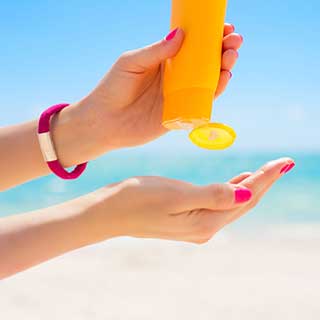Why is it important to prevent sunburns?
Summer is coming and where do you want to be…at the beach, pool, or some other favorite outdoor spot. You spend all year dreaming of finally being able to be outside when it is not as cold. You’ve made your plans for your vacation months ago and I bet they don’t involve having sunburn. You don’t plan on having sunburn, but also don’t usually think too much about it. You should be because the key to preventing the unpleasantness is a simple one. Sunscreen!
 Definition
Definition
You’ve heard of, and hopefully use, sunscreen, but what is it really doing for you? It is a product that is directly applied on top of your skin to prevent ultraviolet (UV) radiation from the sun from reaching your skin and causing damage, such as sunburn or skin cancer. UV radiation is the part of the electromagnetic (or light) spectrum that you can’t see due to wavelengths being shorter than visible light. The two main types are Ultraviolet A (UV-A) and Ultraviolet B (UV-B). UV-A is responsible of lasting skin damage, skin aging, and skin cancer. UV-B is the cause of sunburns, skin damage, and some skin cancers.
Prevention
The key to shielding against both types of UV rays is to use a broad-spectrum sunscreen. Many products sold nowadays combine several different active chemical and physical ingredients that provide protection against UV-B, shorter-wavelength UV-A, and longer-wavelength UV-A. Sunscreen that is “water resistant” or “very water resistant” are great not only for swimming, but for hot days or while playing sports where you will be sweating significantly. This doesn’t mean that you shouldn’t reapply sun screen after being outside awhile. The current recommendation is every two hours you should apply 1 ounce of sunscreen regardless of SPF.
screen after being outside awhile. The current recommendation is every two hours you should apply 1 ounce of sunscreen regardless of SPF.
SPF, or Sun Protection Factor, is the measure of the sunscreen’s ability to protect against skin damage. If you look at it in terms of percentages, SPF 15 filters out about 93%, SPF 30 about 97%, and SPF 50 about 98%. Therefore, it is important to get the best coverage possible for your skin, but it also doesn’t make sense to buy anything over SPF 50 because they are typically more expensive and the benefit is negligible. Other important factors to consider in order to prevent sunburn are to wear clothing that provides coverage of your entire body and to spend time in the shade.
Treatment
If your skin is reddening or you have a tingling feeling on your skin, remove yourself from the sun and start the process to help lessen the severity of the symptoms of your sunburn. It can take 4-6 hours for symptoms to occur, which is why you often don’t feel anything until after you have already removed yourself from the sun. The key is to take a cool shower/bath and then put on moisturizing cream or lotion. Not only does this help soothe the skin, it can make the peeling and flaking less noticeable. Remember to drink plenty of fluids, such as water, juice, or sports drinks, for a couple of days to help prevent dehydration. Take a dose of ibuprofen, or similar anti-inflammatory, as soon as possible and continue this for the next 48 hours (be sure to follow the directions on the packaging as far as dosage and frequency). Most cases can be treated at home, but if you have any fever and chills with headache, dizziness, sleepiness, dry mouth, thirst, and/or reduced urination, seek immediate medical attention. You want to have fun and enjoy the outdoors during the summer time, but it’s important to do so safely. With a little planning and keeping vigilant about sunscreen application, you can avoid ending up with sunburn and the potential for long term skin damage and get back to enjoying your outdoor activities. For more information about sunscreen, sunburns, and skin cancer, please visit the Skin Cancer Foundation at www.skincancer.org.